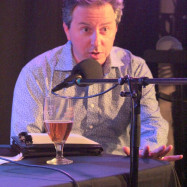Digital can alter the kind of poetry we write. But is there still a 'gut love' for print?

The success of poetry chart-topper Warsan Shire, allied to the celebrity of Beyoncé; the power of the internet in helping to produce new kinds of poems; and the way that digital has changed the economics of poetry publishing all featured in a wide-ranging discussion – or colloquy – provocatively titled The end of the page? at the Troubadour on Monday night.
Four poets – Carrie Etter, Hannah Lowe, Gregory Leadbetter, and Richard Price – read their poetry in the first half of the evening, and then took part in the discussion chaired by Coffee-House Poetry’s CL Dallat, who opened the discussion on what he described as “the biggest revolution since the invention of printing” by saying that “you could go home tonight”, write a poem, and “have it visible to your 5,000 friends by tomorrow morning”.
Carrie Etter, pictured right, who teaches creative writing at Bath Spa university, said she had a ”gut love for print”, but added that online teaching meant that students from around the world, often with mobility problems, were able to study communally in the comfort of their own homes; and online forums offered support and encouragement, in a way that wasn’t there when she first started sending out her own poetry as a teenager from Normal, Illinois – “we all have to grow up somewhere”. On the other hand she had been surprised at the enthusiasm with which her third-year students had embraced the idea of an end-of-year poetry pamphlet that reflected their work.
Hannah Lowe, whose new collection Chan features Jamaican saxophonist Joe Harriott, said: ”Digital has changed what gets written about.” Without the ability to do research online, her new book “would probably not exist”. In the same way, her chapbook Ormonde about her father’s journey from Jamaica to England had been facilitated with information from archives that she accessed in her living room. She added: “You can now fill a book with references, and assume that people will Google them. It doesn’t need tons and tons of footnotes, [as there are in] The Waste Land. There is a democracy about information – and different poems get written because of what we find on the internet.”

Richard Price, pictured with Hannah Lowe, who is head of content and research strategy at the British Library, took a critical view, asking: “What are print and digital not doing for poetry?” He answered by saying that they weren’t doing enough to promote a good love and understanding of poetry: “They both have a massive potential to tell the wider populace what poetry is about.”
He quoted one example of where the message had got through, in the use of Warshan Shire’s poems in the video album Lemonade by Beyoncé, “one of the best things has happened in mainstream poetry fcr a very, very long time”. A chapbook of her poetry featured in the film, and published by Manchester-based flipped eye in 2011, had recently been reissued, “and it’s a poetry bestseller”. He added that work by hip-hop group Grandmaster Flash & the Furious Five in the mid-1980s counted as some of the most exciting poetry I’ve ever heard”. Later a questioner from the floor mentioned the success of US poet RM Drake on Instagram, after being shared by Kim Kardashian.
Carrie Etter said that print on demand was belping more publishers in the UK to survive and succeed - she knew of at least one publisher that was able to break even on sales of fewer than 100 copies. “This is a really wonderful thing – it means that a lot more poetry publishing is affordable, and publishers are more able to take risks.”
Hannah Lowe said that she liked to get paid for her poetry. “The whole system of poetry is accepting that you’re not going to be able to make a living out of it – I don’t see how digital has an impact on that.” Richard Price said that the numbers of published poets who were also employed on creative writing programmes had made the economic situation more complicated. He also asked: “What if we had the time and skills to make digital poetry – what kind of digital poetry would we make?”
Hannah Lowe spoke of the next generation: “There’s a new kind of literacy coming up that needs to be taken seriously. Have you ever seen a 16-year-old text? You can’t see their thumbs moving. Our son was scrolling on my iPhone at three months. But what’s being lost is the literacy of books.”
Richared Price insisted however that kids “love the ultra-physicality of books”. And CL Dallat concluded by wondering that maybe “as books become rarer, they become more interesting”.
Greg Freeman




